

Edition 62 | JUNE 2024 THE UK’S #1 TAXI NEWS SOURCE OVER 5 MILLION MAGAZINE READS AND COUNTING... PLUS CROSS-BORDER POLL, RESPITE FOR CABBIES, AUTONOMOUS TAXIS AND UK NEWS ROUND-UP HOW IS IT EFFECTING THE TRADE? CROSS-BORDER CAPITAL IMAGE CREDIT: DALL.E (AI GENERATED)
CAN LONDON STOP DOWNWARD TREND?
NIGHTTIME
WHY CAN’T PHV NUMBERS BE CAPPED? FEATURE ECONOMY


TaxiPoint Chief Editor:
Perry Richardson
TaxiPoint Publishing & Advertising Manager:
Lindsey Richardson
Visit us online at:
www.taxi-point.co.uk
Write to us at:
contact@taxi-point.co.uk
Advertising enquiries at:
advertising@taxi-point.co.uk
The publishers reserve the right to refuse, withdraw, amend or otherwise deal with all advertisements without explanation. All advertisers must comply with the British Code of Advertising practice.
The views expressed in this publication are not necessarily those of the publishers.
All written and image rights are reserved by the author as displayed.
Reproduction in whole or in part without prior permission from the publisher is strictly prohibited.
Copyright brand TaxiPoint 2024. Creative Common image licences displayed where applicable.

FROM THE EDITOR
PERRY RICHARDSON
ELECTION
TIME!
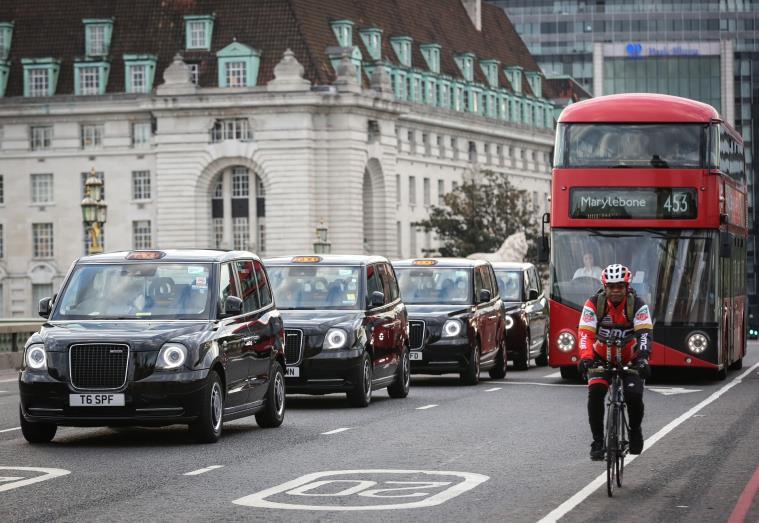

Hello and welcome to our June 2024 edition of TaxiPoint Magazine.
We have an election! Elections make for interesting times in the taxi industry and this will no doubt have many repercussions. Let’s start with the next month and the lead up to 4 July. Historically businesses slow down their spending and business activity until the result is determined. This election may not have as big an impact given the time of year, and many people seem more certain of the outcome. We will have to see.
Once the election is done, what can we expect? If it’s a Tory win, probably more of the same and the continuation of the Private Hire Vehicle (PHV) VAT consultation. If Labour were to gain power, then it could be the start of a big shake up, starting with changes to cross-border hire rules and possibly a different outlook regarding the VAT consultation. There’s certainly interesting times ahead.
Be lucky,
 TaxiPoint
TaxiPoint
Editor and Founder
2 | TAXIPOINT | JUNE 2024 | EDITION 62 WWW.TAXI-POINT.CO.UK
IMAGE CREDIT: LEVC

WHY CAN’T THE GROWING NUMBER OF PRIVATE HIRE VEHICLES NOT BE CAPPED?
The escalating number of private hire vehicles (PHVs) on UK roads has become a contentious issue, drawing significant attention from both industry stakeholders and the public. Despite increasing calls for regulation to cap the number of PHVs, the current legal framework remains unaltered, leaving many to question why such measures have not been implemented.
Paul Elliott from the Department for Transport (DfT) recently addressed this issue, highlighting a critical distinction in the licensing powers available to authorities. Elliott explained that licensing authorities in England are not permitted to limit the number of PHVs they licence. In contrast, authorities outside London can
restrict the number of taxis, although this is a power that is rarely exercised. The DfT views such restrictions as potentially harmful to passengers, as they can reduce availability and increase waiting times.


4 | TAXIPOINT | JUNE 2024 | EDITION 62 WWW.TAXI-POINT.CO.UK
IMAGE CREDIT: DALL.E (AI GENERATED)


Hackney carriage legislation allows licensing authorities to impose limits if they determine that the current number of licences sufficiently meets public demand. This provision is not extended to PHV licences, which must be pre-booked through licensed operators rather than hailed on the street like hackney carriages.
The proliferation of ride-sharing apps has significantly increased the number of PHVs, leading to intensified calls for new regulatory caps. Industry representatives and taxi drivers have frequently questioned why PHV licences cannot be capped similarly to hackney carriages. However, the Roads Traffic Act 1985 explicitly states that licensing authorities can only refuse to grant hackney carriage licences if there is no significant unmet demand for such services within their jurisdiction.
Section 16 of the Act outlines: "The grant of a licence may be refused, for the purpose of limiting
the number of hackney carriages in respect of which licences are granted. If, but only if, the person authorised to grant licences is satisfied that there is no significant demand for the services of hackney carriages (within the area to which the licence would apply) which is unmet."
This provision grants authorities the power to manage the number of taxis in operation, ensuring that supply meets demand without exceeding it. However, no equivalent measure exists for PHVs.
The absence of similar regulatory powers for PHVs means that their numbers continue to grow unchecked. This unchecked growth poses several challenges. Firstly, it affects the traditional taxi industry, where drivers often face decreased demand and increased competition. Secondly, it raises concerns about urban congestion and environmental impact, as more vehicles flood the roads.
5 | TAXIPOINT | JUNE 2024 | EDITION 62 WWW.TAXI-POINT.CO.UK


CROSS-BORDER

7 | TAXIPOINT | JUNE 2024 | EDITION 62 WWW.TAXI-POINT.CO.UK
CAPITAL? WILL UBER
VEHICLE INCENTIVES SHIFT MORE
LICENSING TO LONDON?
’S ELECTRIC
DRIVER

combined, these incentives offer a total potential saving of up to £22,000.
As of end of May, TfL has 106,575 licensed PHV drivers, but not all of those operate within the TfL boundaries, with some choosing locations like Gatwick Airport. The full impact of Uber’s EV incentives on the distribution of driver licences remains to be seen, but the potential for a shift is there.
This potential increase in London comes against the backdrop of an intriguing licensing trend in places like Wolverhampton. A Freedom of Information request revealed a significant pattern: 96% of the taxi and PHV drivers licensed in Wolverhampton in the past year actually reside outside the council area. Specifically, 20,375 out of 21,188 drivers licensed in Wolverhampton live elsewhere.
With TfL now offering up to £22,000 in financial incentives for London-licensed drivers, a shift in licensing dynamics in the London region could be

on the horizon. This could entice drivers to choose London’s licensing authority over others, particularly for those looking to invest in an EV.
TaxiPoint contacted TfL for comment who failed to respond.

8 | TAXIPOINT | JUNE 2024 | EDITION 62 WWW.TAXI-POINT.CO.UK

CRISIS IN THE CAB: UK'S NIGHTTIME ECONOMY AND ITS TOLL ON TAXI DRIVERS
Across the United Kingdom, the nighttime economy is experiencing a significant downturn, profoundly impacting the livelihoods of taxi drivers who once thrived during the late hours. From small towns to larger cities, the narrative is increasingly grim, as drivers report a drastic drop in demand, altered consumer habits, and regulatory challenges that together paint a bleak picture for the industry.
In Sudbury, the decline is palpable. A local taxi operator describes the situation as "dire", with the closure of nightclubs and a significant reduction in evening customers making "Friday

nights so bad... Weekday evenings are a waste of time". This scenario is not isolated but indicative of a broader trend affecting many regions outside the bustling urban centres.
Ian Moore, operating in rural Yorkshire, uses the term "tumbleweed" to describe the desolation.
The aftermath of the COVID-19 pandemic has reshaped his business strategy, forcing him to abandon street work in favour of scheduled day contracts, airport transfers, and group outings.
The shift reflects a wider move among drivers who find street bookings more “rare” due to the evaporated demand.
In Chester, the saturation of the market by ridesharing giants like Uber is a major concern. Philip Hancock expresses frustration, stating: "Chester is finished. Uber has saturated the town." He highlights the detrimental effects of cross-border hiring, suggesting it "should be illegal" as it allows drivers licensed in other areas to undercut local operators, leading to an unsustainable competitive environment.
David Grant from Salisbury succinctly notes, "we haven’t got one [a nighttime economy] in Salisbury anymore". A stark testament to the disappearing nightlife. Similarly, Allan Miller from North Tyneside describes the shift in his work schedule to "a 9 to 5 job now... Night done for", with increasing expenses driving earnings "below minimum wage".
The narrative from Stoke-on-Trent and Newcastle, echoes a common theme of a significant downturn from the vibrant nightlife of a decade ago, "not a patch on what it would’ve been 10 years ago!"
Lee Ward acknowledges that while the night economy has reduced due to factors like the smoking ban, increased drink prices, and the

convenience of online entertainment, the core issue remains the influx of drivers from other areas. He suggests, "so many local issues can be resolved by ending cross-border hiring". He points out that this practice is diluting earnings for locally licensed drivers.
Junayed Iqbal adds another layer to the crisis, describing his local scene as "full of out-of-town drivers with battered cars and no enforcement".
This lack of regulatory oversight has left the local market "completely dead", with licensed drivers "forced into poverty”.
Reflecting on broader societal changes, another cabbie remarks that "the young ‘uns don't go out in the towns like we did back in the '90s/2000s”, indicating a perceived shift in how younger generations engage with nightlife, further reducing demand for late-night taxi services.
Amidst the widespread decline, Gerard Shields from Greenock stands out with his report of a thriving nighttime scene, "busy, busy, busy". This outlier underscores that while many areas suffer, some pockets of activity remain, potentially offering a blueprint or hope for other struggling regions.
RESPITE FOR CABBIES?
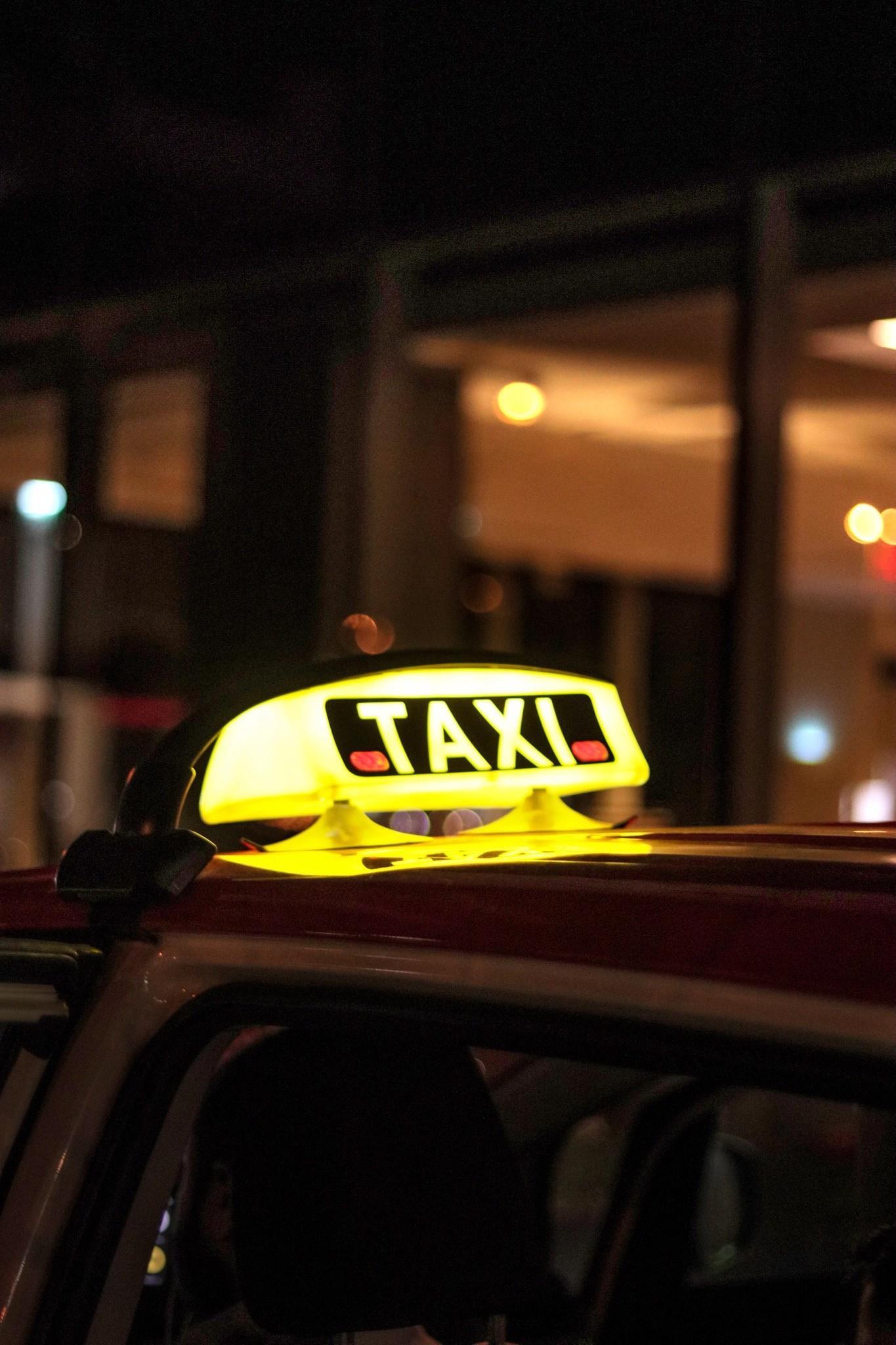
The taxi industry faces a continuing trend: a declining number of drivers amidst a rise in private hire vehicles (PHVs). With PHVs flooding urban markets and out-of-town minicabs penetrating a growing number of areas, local taxi drivers find themselves navigating an increasingly competitive landscape.
Urban areas, previously bustling with taxis, now witness a contrasting scene. As PHVs continue to proliferate, the sheer volume threatens the stability of traditional taxi services. This saturation challenges the ability of taxi drivers to secure consistent work, raising concerns about the sustainability of their livelihoods.
However, there's a flip side to this coin. The reduction in taxi numbers might paradoxically benefit those who remain when it comes to peak time usage at taxi ranks. With fewer taxis available, the remaining drivers could potentially enjoy a
larger share of the remaining customer demand. This scenario presents a short-term advantage, offering relief and possibly more lucrative shifts for the drivers who stick it out.
But the question of sustainability looms large. Ensuring a robust and dependable taxi service requires maintaining an optimal number of cabs on the road. The current imbalance, spurred by an unlimited number of PHV licensees, should demand attention. However, the Government remain uninterested in addressing the issue of cross-border hiring, which would in turn allow for better consideration of recruitment strategies and possibly regulatory adjustments to manage the influx of PHVs.
The industry stands at a crossroads: How can it recalibrate to ensure both short-term viability for current drivers and long-term health for the taxi sector?


Results from a recent survey conducted by TaxiPoint have revealed that nearly four in five people are advocating for the complete overhaul of existing crossborder taxi and private hire regulations.
The poll revealed that 79% of the 1,700 plus respondents favour abolishing the current rules governing out-of-town operations.
Cross-border hiring allows taxi and private hire drivers to accept pre-booked jobs via an operator that start out of the area where they are licensed. This practice has become a point of contention due to concerns about fairness and safety. Critics argue that it disrupts local taxi services and undermines area-specific regulations designed to protect passengers and drivers alike.
Taxi driver Valentin Costea emphasised the need for local operation, stating: "Everyone should stay in the areas where they are licensed. If you have a trip outside your area, complete the job and return home. This approach can protect the local drivers."
Conversely, cross-border expert Lee Ward pointed out the inconsistencies in the current system, noting: "Localism is necessary for conditions to suit the area they apply to. Why should drivers and

vehicles have to change when it's the operators' systems that broke the intention of the legislation? The focus should be on dealing with the operators, not the drivers."
David Rowden offered a nuanced perspective, advocating for a balance between national standards and local enforcement. He suggested: "I think there should be a national minimum standard enforced at a local level. We shouldn't have borders hindering our work. I have 7 LAs in my area with multiple local companies operating across all 7. It's not in the driver’s interest or the customer’s interest to send drivers back to their LA. I do think

14 | TAXIPOINT | JUNE 2024 | EDITION 62 WWW.TAXI-POINT.CO.UK

the Wolverhampton thing is an issue though that needs to be addressed by a national standard.
“I'd like to see cross bordering scrapped to a

Jason Smith, another cabbie, called for uniform licensing standards across the country. "There needs to be a national standard for licencing, all
abide by the same conditions for age, milage, condition of vehicles and all pay the same licence fees etc irrespective of where you licence,” he said.

approach would replace the multiple regional licences currently in place, potentially simplifying the regulatory landscape. However, this would also require a change in how licensing enforcement is conducted and paid for, which currently sits with the local authorities.

15 | TAXIPOINT | JUNE 2024 | EDITION 62 WWW.TAXI-POINT.CO.UK

CAN IT BE STOPPED? LONDON’S TAXI DRIVER NUMBERS CONTINUE DOWNWARD TREND
Recent data from Transport for London (TfL) has highlighted an ongoing troubling trend within the capital's iconic taxi industry. As of the latest figures, there are currently just 17,310 licensed taxi drivers in London.
The gradual decline in the number of taxi drivers is a pattern that has been observed over several years, raising concerns about the long-term viability of this essential service.
Delving into the specifics, the majority of these licences are held by drivers with the 'All London' green badge, totalling 15,563. The remaining 1,802 drivers hold the Suburban yellow badge, which allows them to operate in designated suburban sectors of the city.
Historical data presents a clearer picture of the industry's trajectory. In the 2009/10 period, London boasted 24,914 licensed taxi drivers. However, this number has been steadily declining. By 2013/14, the number of drivers had slightly increased to a peak of 25,538, supported by 22,810 vehicles. This peak was short-lived as subsequent years have shown a persistent decrease. By 2022/23, the total number of licensed taxi drivers had dropped to 18,297, with the number of vehicles also falling to 15,130.
Several factors could be contributing to this decline. The rise of ride-hailing apps, regulatory changes, and the economic impact of the COVID-19 pandemic have all likely played a role. The introduction and expansion of services such as Uber and Bolt has seen the number of licensed private hire drivers swell to 106,575.
IMAGE CREDIT: FREENOW

Regulatory challenges have also been a factor. Changes in more expensive electric vehicle requirements, increasing insurance costs, and changes on diesel cab age limits have added pressure on taxi drivers. These regulatory hurdles, while aimed at improving service quality and reducing environmental impact, inadvertently made it more challenging for part-time drivers to stay in the market.
The COVID-19 pandemic further exacerbated these challenges. Lockdowns and reduced travel significantly impacted the demand for taxi services, leading to ongoing financial strain for many drivers. Although the city is gradually recovering, the aftershocks of the pandemic continue to be felt, with many drivers choosing to leave the profession or retire early.
This downward trend raises important questions about the future of London's taxi industry. Taxis are not just a means of transportation; they are an
integral part of the city's identity and public transport network. The decline in driver numbers could affect the availability and reliability of taxi services, particularly in areas not well served by other forms of public transport.
Stakeholders, including TfL, policymakers, and industry representatives, have been talking, but little has been seen in the way of action. Potential solutions include revising the licensing criteria currently in place for the ‘Knowledge of London’ tests, providing financial support or incentives for existing drivers, and allowing taxis access to more road space to comprehensively do their job without undue risk of fines and penalty points.
The steady decline in the number of taxi drivers in London is a worrying trend that does demand immediate attention. Ensuring the sustainability of London's taxi industry is not only crucial for the drivers themselves but also for the millions of residents and visitors who rely on this vital service.

17 | TAXIPOINT | JUNE 2024 | EDITION 62 WWW.TAXI-POINT.CO.UK
SELF-DRIVING: WHAT WOULD A TAXI DRIVER’S JOB LOOK LIKE WITH ‘LEVEL 3’
AUTONOMOUS DRIVING?
Autonomous vehicle (AV) technology is gathering pace and entering transport networks around the world with varying success. Whilst fully autonomous driving may still be a way off, it's not infeasible to think lower level autonomy may enter the UK taxi trade in a driver's working lifetime.
So what would a taxi driver’s job look like as a result? A taxi driver operating a Level 3 automated vehicle would see their role shift from direct vehicle operation to a more supervisory and customer-focused position, reflecting the capabilities and limitations of this level of automation.

Here’s a detailed look at what a tactical driver's job might entail in this scenario:
Primary Responsibilities:
1. Monitoring Systems: While the vehicle can handle all aspects of driving under certain conditions, the driver must remain alert and ready to take over at a moment's notice. This requires continuously monitoring the vehicle’s systems and the driving environment to ensure that everything functions as expected.
2. Taking Control When Needed: Level 3 automation is not equipped to handle every possible driving scenario. The driver must be prepared to intervene in situations where
IMAGE CREDIT: DALL.E (AI GENERATED)
the automation fails or is outside its operational parameters, such as severe weather conditions, unexpected road layouts, or complex traffic scenarios that the system cannot navigate.
3. Ensuring Safety: The driver's role in ensuring passenger safety becomes more critical with automation. This involves verifying that the vehicle's sensors and cameras are clear, systems are fully operational, and no technical issues are present before and during the journey.
Secondary Responsibilities:
1. Customer Service: With the vehicle handling routine driving tasks, the driver can focus more on providing enhanced customer service. This could involve interacting with passengers, offering information about the route or destinations, managing in-cab amenities, and ensuring a comfortable and pleasant travel experience.
2. Route Management: Although the vehicle can navigate on its own, the driver can still oversee the route selection, particularly in complex urban environments or in cases where specific passenger requests need accommodation. They would manage the GPS or mapping systems to optimise
the route based on traffic conditions, road closures, or passenger preferences. The Knowledge of London and other topographical testing would still be vital.
3. Emergency Handling: In the event of a system malfunction or failure, the driver must be adept at regaining control of the vehicle swiftly and safely. This requires a high level of skill in emergency driving techniques and a thorough understanding of the vehicle's manual and automated systems.
To excel in this role, drivers would need specialised training that goes beyond traditional driving skills. This training would cover the technical aspects of the automated systems, including how to operate and troubleshoot them, as well as enhanced customer service skills to maximise passenger satisfaction.
There may be an argument that drivers should be equipped with advanced diagnostic tools to monitor the health of the vehicle’s automated systems. They would also use interfaces that provide real-time data on system performance and alerts to potential issues.




NEW FIXED PRICE TAXI FARES ON FREENOW APP AIMING TO BOOST NIGHTTIME CAB BOOKINGS
In a bid to entice more passengers onto the FREENOW app the mobility firm has announced the launch of its 'Fixed Fare' initiative.
Taxi drivers using the app will notice a new option for some jobs during the night hours, specifically from 8pm to 7am on weekdays. The initiative aims to provide passengers with a locked price before they book their ride.
The move comes as a response to passenger preferences for transparency in pricing. FREENOW say users are more likely to book a trip if they can ascertain the cost upfront. FREENOW's strategy is to ensure drivers don't miss out on potential earnings by tapping into this segment of unfulfilled customer demand. By offering fixed-price cabs, the company anticipates an increase in demand from a wider base of passengers, subsequently channelling more work to its drivers who are willing to take fixed price fares.
PRIVATE HIRE OPERATOR VEEZU BECOME OFFICIAL PARTNER FOR LEEDS RHINOS

Private hire operator VEEZU has become the official ride partner for Leeds Rhinos.
Through the partnership, Veezu, formerly known as Amber Cars, will provide fans travel to and from the home grounds of AMT Headingley Stadium to give the best match day experience possible.
Ben Turnbull, Business Development Manager at Leeds Rhinos, said: “We are delighted to welcome Veezu into our family of partners here at Leeds Rhinos.”
The pricing structure for these fixed fares will align with Transport for London’s (TfL) taxi tariff, aiming to replicate the metered fare as accurately as possible. These fares will be available to all regular on-demand trips that fall within the designated night-time window.
Drivers should be able to identify these trips with the words 'Fixed Fare' displayed at the bottom of the screen. This feature is designed similar to airport trip offers, where the fare doesn’t need to be manually entered post-trip; instead, it will be automatically processed by the app.
20 | TAXIPOINT | JUNE 2024 | EDITION 62 WWW.TAXI-POINT.CO.UK
BUSINESS NEWS
IMAGE CREDIT: VEEZU

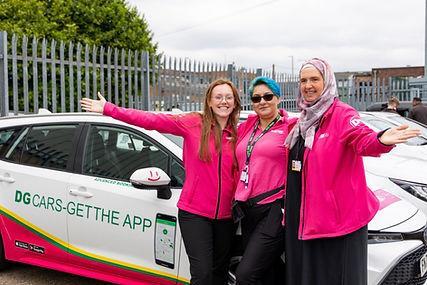
DG CARS CHAMPION FEMALE DRIVERS AT ROSIE MAY DAY CELEBRATION
Nottingham's private hire operator, DG Cars, marked Monday 20 May with a special event dubbed 'Rosie May Day'. This occasion, dedicated to the Rosie May Foundation, showcased the company's commitment to encouraging female participation in the taxi and private hire industry.
The Rosie May Foundation, established in 2004 by Graham and Mary Storrie after the heartwrenching loss of their daughter, has since urged businesses and the public to organise events during May and June.
Operating out of Nottingham and extending its reach to Sri Lanka and Nepal, the Foundation focuses on aiding families in crisis through various educational and empowerment initiatives. Among these, the 'Think Pink' programme stands out by transforming the perception of taxi driving for women, making it a viable and respected career choice.
DG Cars, having aligned with this vision since 2022, has successfully introduced over 50 female drivers into its East Midlands operations through robust training programmes.
UBER SHUTTLE LAUNCHES WITH FUTURE AIRPORT COLLABORATION
ON THE CARDS

The shuttle service promises reduced fares compared to traditional UberX rides by allowing travellers to share their journey with others headed to the same location.
Khosrowshahi highlighted the strategic partnership with Live Nation amphitheatres and Miami’s Hard Rock Stadium, marking the initial rollout of Uber Shuttle. These venues, known for hosting large events like Miami Dolphins games and the Formula One Crypto.com Miami Grand Prix, represent ideal launch points for testing and refining this shared travel solution.
Further ambitions for the service include collaborations with airports and city officials worldwide to extend the shuttle service.
Uber hopes the approach will provide a strategic pivot towards enhancing user experience while addressing common travel pain points. By integrating with major event venues and potentially airports, Uber Shuttle is set to redefine how we think about group travel in an urban context.
This development marks a significant step in Uber's ongoing evolution from a simple ridehailing service to a comprehensive transport solution provider, meeting diverse consumer needs with innovative, practical options.
21 | TAXIPOINT | JUNE 2024 | EDITION 62 WWW.TAXI-POINT.CO.UK
IMAGE CREDIT: UBER
IMAGE CREDIT: DG CARS


PROTEST CALLING FOR MORE COUNCIL ACTION AGAINST TFL LICENSED UBER DRIVERS
Private hire drivers at Gatwick Airport have protested outside a Crawley council meeting, urging councillors to take decisive action against Uber.
The drivers argue that Uber's operations are negatively affecting their earnings due to lax enforcement of local licensing laws.
The controversy began when Gatwick Airport started promoting Uber services to its passengers, including designating specific bays for Uber at the airport. Unite Union say this move has given Uber an edge, allowing vehicles registered in London to operate freely in Crawley. This is a privilege the union says is not extended to local private hire taxis, which are restricted to picking up fares within their licensed areas unless pre-booked.
The cross-border imbalance has led to an influx of London-registered Uber vehicles into Crawley, seeking to capitalise on the local market.
Unite regional officer Dominic Rothwell expressed his concerns, stating: "Gatwick airport should not be hand in glove with a race to the bottom employer like Uber. Our members are fighting back against the airport and Uber but Crawley council’s lack of action in enforcing its own taxi licensing rules is leaving them at an unfair disadvantage.”
Rothwell emphasised that the business model established by Gatwick and Uber at the airport is the root cause of the problem. He argued that Crawley council has the authority to rectify the situation by penalising both Gatwick and Uber for their disregard of taxi licensing laws.
Rothwell said: “Ultimately, it is Gatwick and Uber that are causing this through the business model they have set up at the airport. Crawley council has the power to stop this by sanctioning Gatwick and Uber for deliberately breaking their taxi licensing laws.”
22 | TAXIPOINT | JUNE 2024 | EDITION 62 WWW.TAXI POINT.CO.UK

CHARGING LIMITATIONS: WILL THE ELECTRIC TAXI SHIFT BE STIFLED BY THE 44% OF HOUSEHOLDS UNABLE TO PLUG-IN?
The UK Government's environmental strategy sets a bold target: by 2030, the sale of new petrol and diesel vehicles will cease. This ambitious plan positions electric vehicles (EVs) at the forefront of the transport sector's future.
However, a study in 2022 by Lloyds Bank highlights a significant barrier that continues to disrupt this transition for many, including taxi drivers.
According to the study, a staggering 44% of UK households find themselves in properties unsuited to electric vehicle ownership, primarily due to the lack of a private garage, driveway, or dedicated parking spot.
This makes the installation of a personal charging point unfeasible. For taxi drivers, this issue is particularly pressing. Without easy access to personal charging stations, the switch to electric taxis becomes not just an inconvenience but a potential professional blockade.
The increase in Battery Electric Vehicle registrations spiked fast in recent years, but a plateau is likely when enthusiasm for EVs is dampened by logistical challenges. The fact that 30% of mortgage applicants report having no garage or car space underscores a widespread unpreparedness for a seamless transition to electric vehicles.
Government legislation now mandates that newbuild homes, workplaces, and supermarkets come equipped with charging points. This forwardthinking policy suggests a landscape where future infrastructure aligns more closely with
environmental goals. However, the immediate reality remains stark for existing homeowners and renters without the means to charge at home.
For taxi drivers, the implications are profound. Those residing in urban areas without private driveways or garages are at a disadvantage, potentially facing higher costs and time spent charging at public stations if they can find them.

Rural areas, where charging stations are scarce, pose another layer of difficulty, potentially isolating drivers further from the EV revolution.
While the push towards electric vehicles is commendable and necessary for environmental sustainability, significant hurdles remain. For taxi drivers, the road to electrification is fraught with challenges, chiefly the need for accessible and convenient charging solutions. The transition is not just about vehicle change but also about a supportive infrastructure that caters to all, ensuring that the drive towards green transportation doesn’t leave anyone behind.
23 | TAXIPOINT | JUNE 2024 | EDITION 62 WWW.TAXI-POINT.CO.UK


FINDING THAT NEXT TAXI FARE: IS IT JUST LUCK OR IS THERE METHOD TO ENHANCE YOUR CHANCES?
Securing the next fare as a taxi driver is less about luck and more about strategic decision-making and understanding the urban transport dynamics. From the outside, many might believe that finding work is a matter of being in the right place at the right time, and there is always an element of luck, but there are effective strategies that can significantly enhance a driver’s ability to secure more fares over the course of a working shift.
It would be great if passengers are always readily available immediately after a driver completes a trip. Ideally, this would be true, with a seamless flow of customers hopping in as soon as one set departs.
However, the reality for most taxi drivers is quite different.
Effective Positioning to Meet
Passenger Demand
One of the most effective strategies for finding new passengers is to identify and target areas where there is demand, yet other taxis are scarce. This approach should mean less dead time empty and not earning, reducing idle time and increasing overall efficiency. For example, being aware of local events, peak business hours, and key social hours can guide drivers to locations with heightened demand.
24 | TAXIPOINT | JUNE 2024 | EDITION 62 WWW.TAXI-POINT.CO.UK IMAGE CREDIT: DALL.E.(AI GENERATED)

Drivers should also consider the broader spectrum of potential passengers beyond those on the streets. Utilising digital hailing platforms, in addition to traditional street pickups, can open up a larger pool of customers. This dual approach allows drivers to tap into a more extensive network, reducing the risk of long waits in areas oversaturated with taxis.
Diversification of Location and Time
It’s crucial for drivers to diversify their locations throughout the day. Areas with high demand can vary significantly; morning rushes are different from lunchtime peaks or evening surges. For instance, business districts might be lucrative in the mornings and evenings, while tourist spots could prove more profitable during afternoons and weekends.
Understanding these patterns and being flexible can lead to more consistent fares. For example, knowing which local businesses and offices use taxis for transporting staff can be a gamechanger. Knowing when shifts end or when major events let out can position a driver strategically ahead of competitors.
A common pitfall many drivers encounter is following the lead of other taxis. If a taxi driver simply follows an empty taxi, they will never be in a position to pick-up a passenger from the street. Instead, breaking away and exploring different streets or areas can lead to unexpected pickups.
Many drivers tend to cluster around taxi ranks, especially at train stations and airports. While this can sometimes yield quick fares due to high passenger turnover, it often results in unnecessary waiting due to the sheer number of taxis present. Exploring less obvious but busy locations such as hospitals, theatres, and large shopping centres — can, when timed right, prove more beneficial.
Leveraging Technology and Local Knowledge
Today’s taxi industry is bolstered by technology, with various apps and tools available to help drivers predict where and when to find the next fare. Using these technologies can provide realtime data on traffic patterns, events, and even passenger preferences.

In some cities, maintaining a good relationship with local businesses, hotels, and restaurants can lead to direct calls for service. There are some establishments who prefer calling on recommended drivers they know to their customers or use a set booking platform over others.
Ultimately, the key to consistent success as a taxi driver is to build a strategic approach based on understanding and reacting to the dynamics of urban transport. This includes:
• Staying Informed: Keeping up-to-date with local events, peak times, and traffic updates.
• Being Adaptable: Changing locations and strategies based on time of day and passenger flow.
• Using Technology: Leveraging apps and digital platforms to access a broader customer base.
• Networking: Establishing connections with local businesses for direct referrals.
While driving a taxi may appear to be unpredictable, drivers who open up their pool of customers wide and take an informed approach can significantly improve their chances of finding more regular fares.
25 | TAXIPOINT | JUNE 2024 | EDITION 62 WWW.TAXI-POINT.CO.UK
IMAGE CREDIT: DALL.E.(AI GENERATED)

AGE BARRIER: WORRYING INSURANCE CRISIS FOR OVER-70 BLACK TAXI

Ablack cab fleet expert has raised concerns about the increasing difficulty for drivers over 70 to secure insurance.
Many seasoned drivers are now being denied policy renewals purely based on age, regardless of their driving records.
This troubling trend comes amid a broader spike in insurance premiums, which have risen by up to a third. Even drivers with many years of no claims are not spared from these hikes.
In the backdrop of these challenges, fleet insurance premiums have jumped by as much as £3,000 annually, pushing rental prices higher.
A London taxi fleet owner highlighted these financial pressures, bringing to light the often overlooked struggles faced by older drivers. The refusal to insure veteran cabbies is fast becoming a critical issue in the industry.
A black cab fleet expert said in TAXI newspaper:
“It's not much better for mushers (taxi driver owners), as insurance premiums are rising by anything up to a third, again irrespective of individual claims, often even for people with no claims in many years.
“There is also a major problem with insurers refusing to cover older drivers, with some being refused a renewal past the age of 70!”
26 | TAXIPOINT | JUNE 2024 | EDITION 62 WWW.TAXI-POINT.CO.UK

CRASH-FORCASH INSURANCE FRAUD IS PUSHING MORE TAXI DRIVERS TO ‘PROTECT THEIR BUSINESSES’ SAYS MP
Crash-for-cash insurance fraud is becoming an increasing threat to taxi drivers, according to MP Alison Thewliss.
This criminal scheme involves fraudsters intentionally causing road accidents to make fraudulent insurance claims. Such scams often result in exaggerated or completely fabricated claims for vehicle damage, personal injury, and associated costs.

During a recent parliamentary debate on the topic, Thewliss highlighted the vulnerability of taxi drivers to these scams. "Taxi drivers can particularly fall victim to this kind of scam, which can take their business off the road. They are now obliged to have dashcams, both front and rear, in their vehicles. It would be useful to hear how many people have had
drivers’ livelihoods. Being off the road or having issues relating to insurance or their licence is significant for them this is their livelihood so I can understand why they take the decision to record to protect their businesses. Those who seek to scam are pushing well-meaning, law-abiding citizens into that type of behaviour every day,” Norris said.
27 | TAXIPOINT | JUNE 2024 | EDITION 62 WWW.TAXI-POINT.CO.UK

LONDON NEWS TAXI ASSOCIATION CHIEF CALLS FOR CLARITY ON FUTURE CCTV POLICY IN LONDON BLACK CABS
Steve McNamara, the General Secretary of the Licensed Taxi Drivers' Association (LTDA), has voiced concerns over the introduction of mandatory CCTV in taxis and minicabs, a move proposed in the Mayor's reelection manifesto.
McNamara, once a self-confessed sceptic of in-cab CCTV, acknowledges a shift in his stance due to the increasing number of false claims and problematic driving behaviours on city streets. However, he also highlighted the financial burdens this policy could impose on drivers, differentiating between voluntary and mandatory CCTV installation.
The General Secretary also raised concerns about the data privacy and management issues associated with compulsory CCTV. Looking ahead, McNamara revealed that he is set to meet Seb Dance, the Deputy Mayor for Transport, and Andy Lord, the Transport Commissioner, in the first meeting under the new mayoralty. Top of his agenda is a discussion on the Mayor's manifesto pledge about CCTV in taxis and the broader vision for the future of the taxi trade.
McNamara said: “Personally, I was always very wary of having CCTV in the cab, but with the number of false or exaggerated claims on the rise, the standard of some of the driving on our streets and the cycling vigilantes trying to get you convicted for what is often normal and perfectly safe driving, I have changed my mind.
“Interestingly, the Mayor touched on introducing mandatory CCTV in taxis and minicabs in his manifesto, which will now become his policy programme following his re-election. The problem is, in my world, and I am sure all of yours too, there is a vast difference between choosing to have CCTV fitted and being compelled to have it. That difference is in the cost of installing and maintaining it. If we are to be compelled to have it, surely TfL should pay for it?

“There are also all sorts of complicated issues to consider when introducing it as a mandatory requirement to do with data and privacy and who controls that data. It’s caused huge problems in other licensing areas, so I hope City Hall have given it or will now give it some proper thought. They must recognise that drivers already face enough costs when it comes to licensing and running a cab.”
28 | TAXIPOINT | JUNE 2024 | EDITION 62 WWW.TAXI-POINT.CO.UK

WOOD LANE FLYOVER: TFL ANNOUNCES MAJOR SUMMER ROADWORKS ON LONDON’S A40
Transport for London (TfL) has announced essential maintenance work on the A40 Westway, set to commence in July. This major route, integral to London’s transport network, sees around 90,000 vehicles daily.
Built in 1969, the structures connecting the Wood Lane flyover to the Marylebone flyover are nearing the end of their lifespan. TfL plans to replace four critical joints supporting the slip roads to the A40, ensuring the road remains safe and serviceable.
The maintenance work will occur in two phases to limit disruption.
From 21 July to 22 August 2024, the eastbound slip road from the Westway Roundabout and the southbound A3220 West Cross Route between the Westway and Holland Park Roundabouts will close.
From 2 September to mid-October 2024, the westbound on-slip from the A3220 West Cross Route to the A40 Westway via the Westway Roundabout, and the northbound section of the A3220 West Cross Route from Holland Park to Westway Roundabout, will close.
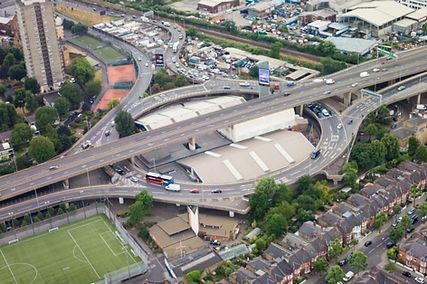
LONDON BRIDGE STATION: TFL ASKS
TAXI AND PHV DRIVERS TO STAY TO 10MPH LIMIT AND KEEP RANKS CLEAR
Transport for London (TfL) has issued a reminder to taxi and private hire vehicle (PHV) drivers which focuses on speed limits and parking restrictions in the London Bridge Station area. The directive highlights the necessity for all drivers to strictly observe a 10mph speed limit when navigating through the bus station area.
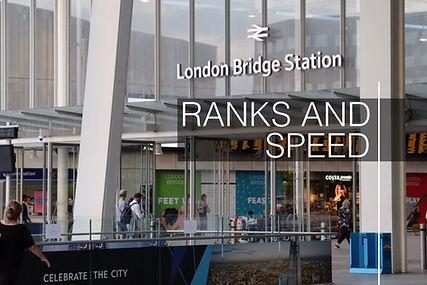
Further to this, TfL has stipulated that taxis must not be left unattended at the designated taxi ranks, both within the station and on the feeder rank located on Guildable Manor Street.
This measure is seen as critical in maintaining smooth traffic flow and access, ensuring that the area remains unobstructed and safe for all users.
TfL's a advice came via an email sent to thousands of taxi and PHV drivers licensed in the capital. Drivers are encouraged to familiarise themselves with the advice to avoid penalties and contribute to a safer working environment for everyone.
29 | TAXIPOINT | JUNE 2024 | EDITION 62 WWW.TAXI-POINT.CO.UK
IMAGE CREDIT: TFL

SIX ARRESTED: MAYOR OF LONDON REVEALS CRACKDOWN ON HEATHROW AIRPORT’S ROGUE TAXI TOUTS

Mabout Operation Gadi, a decisive initiative targeting illegal taxi touts at Heathrow Airport, following a question put to him by London Assembly Member Hina Bokhari.
The operation focused specifically on Terminal 4, with a keen eye on travellers arriving from the United Arab Emirates and lone female passengers.
The touts targeted were said to be notorious for charging extortionate rates, often for journeys into central London. The touts would normally approach unsuspecting travellers and offer rides at prices significantly above the standard rates. This practice not only exploited passengers but also undermined legitimate taxi services operating within legal frameworks.
Operation Gadi was a coordinated effort, mobilising resources from various units. Aviation Command played a central role, supported by the Road Transport Police Command Cabs Unit. Additionally, Arabic-speaking officers from the Staff Support Association were crucial in identifying and communicating with potential targets and offenders, given the specific demographics targeted by these touts.
The operation's success is reflected in the arrests and charges brought against the offenders. Six individuals were apprehended for illegal touting activities. They have all been charged and are now prohibited from entering the airport under stringent bail conditions. This measure aims to prevent any recurrence of such illegal activities in the future.
Beyond the arrests, Operation Gadi also highlighted numerous traffic violations. A total of 15 traffic offences were reported, which included serious infractions such as driving without insurance, speeding, illegal tyres, and evasion of airport fees.
Sadiq Khan, the Mayor of London, said:
“Operation Gadi was launched to combat illegal taxi touts operating at Heathrow Airport.
“These touts were specifically targeting travellers arriving at Terminal 4 on flights from the United Arab Emirates, and lone female travellers. The touts would agree to take the passenger, usually into central London, at an extortionate rate.
“The operation mobilised resources from Aviation Command, the Road Transport Police Command Cabs Unit, and Arabic-speaking officers via the Staff Support Association.
“As a result of Operation Gadi, a total of six people were arrested for illegal touting, all were charged and prohibited from entering the airport under bail conditions. 15 traffic offences were reported, including no insurance, speeding, illegal tyres, and evasion of airport fees.”
30 | TAXIPOINT | JUNE 2024 | EDITION 62 WWW.TAXI-POINT.CO.UK

REGIONAL NEWS
BEWARE OF BOGUS CABBIES USING ‘FAKE PROPS’ TO APPEAR LEGITIMATE WARNS POLICE
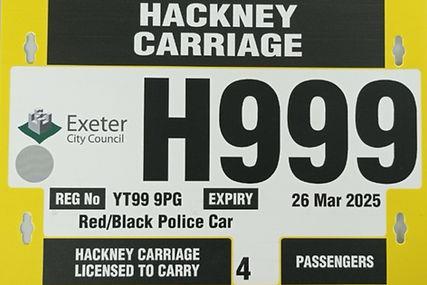
Police have warned the public of people posing as taxi drivers using ‘fake props’ to make them look authentic.
In a recent public safety announcement, Exeter Police raised alarm over the increasing menace of individuals posing as taxi drivers, employing bogus enhancements to their vehicles to mimic legitimate taxis.
According to the authorities, one telling sign of a counterfeit taxi is the configuration of its doors.
Official taxis will invariably be 5-door vehicles. A vehicle that requires passengers to fold over the passenger seat
to access rear seating is not licensed and should be avoided. An Exeter Police spokesperson said via social media: “With the weekend coming up we thought we would post some helpful reminders to take in to consideration if you're going to be using a taxi.
Unfortunately we're aware of people posing as taxi drivers and using fake props to make their vehicle appear like a legitimate taxi.”
They added: “If you have any concerns please leave the taxi immediately. Call 999 if you need to report a crime or suspicious activity.”
ENHANCED TAXI MARSHAL SCHEME TO BOOST SAFETY ON NORTHAMPTON NIGHTS OUT

West Northamptonshire Council (WNC) has announced an expansion of its taxi marshal service, aiming to enhance public safety during busy weekend nights in Northampton.
The initiative, initially launched in December, positions marshals at the Mercer’s Row taxi rank from 11pm to 5am on selected nights. Initially covering ‘pay day’ weekends and bank holidays, the service will now also operate during significant events such as A Perfect Day Festival, Northampton Pride, and Ibiza fest.
Cllr David Smith, Cabinet member for Planning and Communities, said:
“So far, this innovative pilot has proved fantastic in helping us to improve the Night Time Economy in West Northamptonshire and make Northampton town centre a safer and more welcoming place to enjoy a night out.”
31 | TAXIPOINT | JUNE 2024 | EDITION 62 WWW.TAXI-POINT.CO.UK
IMAGE CREDIT: EXETER POLICE

MYSTERY SHOPPER: LICHFIELD TAXI DRIVERS

32 | TAXIPOINT | JUNE 2024 | EDITION 62 WWW.TAXI-POINT.CO.UK
IMAGE CREDIT: LICHFILED DISTRICT COUNCIL

BLACKPOOL'S BATTLE WITH CROSS-BORDER: LOCAL MP CALLS FOR ACTION AS PHV DRIVERS RANK UP AND UNDERCUT CABBIES

In a recent debate in the House of Commons, Chris Webb, Labour MP for Blackpool South, highlighted a significant issue plaguing his seaside constituency: the proliferation of out -of-town Uber and private hire vehicles (PHV).
Webb suggested that companies like Uber are operating without proper licences in Blackpool, posing serious public safety risks. According to Webb, these vehicles are also illegally occupying taxi ranks and undercutting local drivers who comply with regulations.
PHV drivers are not able to pick passengers up from the street or ranks and are not insured to do so.
Webb’s concerns are focused on the impact of these ‘unlicensed taxis’ on local, law-abiding taxi drivers and the broader implications for public safety. He questioned the Government's strategy to address these operations and requested a meeting with the Minister to discuss solutions specific to Blackpool.
Chris Webb MP said: “Blackpool is experiencing the scourge of unlicensed taxis in our treasured seaside resort. Uber and similar companies, which have no operating licence in Blackpool, are allowing passengers to use their unlicensed taxis uninsured, creating a real public safety risk. These unlicensed taxis are parking in local ranks illegally, taking fares from our hard-working, ruleabiding Blackpool taxi drivers. What is the Minister doing to tackle these unlicensed drivers, and will he meet me to discuss this issue in my constituency?”
In response, Guy Opperman, Parliamentary UnderSecretary at the Department for Transport, acknowledged Webb's concerns. Opperman referenced the Government's updated taxi and private hire vehicle best practice guidance, designed to help local authorities regulate the sector more effectively. He promised to provide Webb with detailed information and to consider a future meeting to discuss the issue further.
The core of the problem lies in the controversial cross-border hiring rules. These rules allow licensed private hire vehicles to operate outside the area where they were licensed, as long as the booking is made within the licensing authority's jurisdiction.
The situation in Blackpool is a microcosm of a national issue, calling for a unified approach to taxi and private hire regulation.
33 | TAXIPOINT | JUNE 2024 | EDITION 62 WWW.TAXI-POINT.CO.UK
IMAGE CREDIT: DALL.E (AI GENERATED)

UNLICENSED FAKE TAXI DRIVER BAN
FOLLOWING BELFAST ENFORCEMENT
An unlicensed Belfast taxi driver has been handed a £475 fine and a six-month driving ban after accruing sufficient penalty points to trigger the suspension.
Mark Burns, 50, faced multiple charges at Belfast Magistrates' Court relating to the operation of an unlicensed taxi service.
Burns was fined £75 for using an unlicensed vehicle for taxi purposes, another £75 for operating without a taxi driver’s licence, and £75 for lacking a taxi operator’s licence. The most severe penalty came from driving without insurance, for which he was fined £250 and received six penalty points.
STING WEST LOTHIAN FREEZES TAXI FARES THROUGH TO NOVEMBER 2025

The West Lothian Council's latest statutory tariff review has concluded no adjustments will be made to the existing taxi and metered private hire car fare structure.

These penalties culminated in Burns receiving a driving ban due to the accumulation of points on his licence.
The incident that led to these charges occurred on Sunday 28 May 2023. Plain clothed officers from the Driver & Vehicle Agency (DVA) spotted Burns actively seeking passengers in a silver car along Donegal Street, Belfast. Despite the car lacking the required taxi licence plates, Burns agreed to transport the officers.
Upon completing the journey, the officers revealed their identity and conducted a formal interview. Burns's vehicle was subsequently seized.
The decision ensures that rates remain consistent, with the current fare table effective from 22 May 2024 until 21 November 2025.
Taxi and private hire car tariffs are typically calibrated to balance the operational costs faced by drivers with the financial considerations of passengers.
The fare determination process involves consultations with industry stakeholders, economic assessments, and consideration of consumer price sensitivity. The goal is to achieve a balance that supports the viability of the taxi sector while ensuring that transportation remains accessible for the wider community.
34 | TAXIPOINT | JUNE 2024 | EDITION 62 WWW.TAXI-POINT.CO.UK

TUNBRIDGE WELLS TAXI DRIVER LOSES LICENCE APPEAL AFTER NONDISCLOSURE OF PRISON REMAND
AND HANDED
COSTS OF OVER £3,000
ATunbridge Wells taxi driver's appeal against the revocation of his licence was dismissed at Medway Magistrates, affirming the council's concern for public safety.
The hearing, which took place on 26 April 2024, concluded with the magistrates ruling in favour of the council, also imposing costs of £3,252 on the driver.
The driver had initially lost his licence in May 2023, when it came to light that he failed to report crucial information to the licensing authorities, including a period of remand in prison. This omission breached the regulations set out in the council’s Hackney Carriage and Private Hire Policy, which mandates a high standard of conduct and transparency from all licensed drivers.
The council's Head of Housing, Health, and Environment took swift action to withdraw the licence, citing a direct threat to
public safety as the driving force behind the decision.
In upholding the council’s decision magistrates also awarded costs of £3,252 to the council.
A Tunbridge Wells Council Licensing spokesperson said: “When people get into a taxi, they want to feel safe and therefore, as you would expect, the council holds taxi and private hire drivers to high standards. As this case shows we will take action if drivers licensed by this authority choose to disregard them.”

35 | TAXIPOINT | JUNE 2024 | EDITION 62 WWW.TAXI-POINT.CO.UK
WEST BERKSHIRE CHARGES

ENFORCEMENT NEWS
UNINSURED BLACK TAXI SEIZED BY POLICE IN LONDON
‘DANGEROUS PARKING’: PRIVATE HIRE DRIVER PENALISED WITH POINTS AND FINE FOR
BLOCKING PETROL STATION ENTRANCE

The City of London Police's road traffic unit has seized a black cab after discovering the vehicle was uninsured.
The incident occurred when officers stopped the taxi during routine checks. Further inspection revealed additional issues, including objects obstructing the driver's view of the road.
The driver now faces a £300 fine and the addition of six penalty points to their driving record. The cab was seized, and the driver was reported to Transport for London (TfL) for further action.
A City of London Police spokesperson said:
“A fare cop! Our road traffic unit stopped a black cab and found that there was no insurance.
“There were also objects in the windscreen that obscured the driver’s view of the road.
“Six points, a £300 fine, cab seized and driver reported to Transport for London.”

A spokesperson from Surrey Roadsafe highlighted the issue in a social media post. The misplaced vehicle not only forced pedestrians to dangerously navigate around it by walking on the road but also blocked access to a local petrol station.
Authorities have responded by issuing the driver with a penalty. The driver has been given 3 penalty points and a fine, a move that Surrey Roadsafe hopes will serve as a deterrent to other drivers considering similar actions.
A Surrey Roadsafe spokesperson said: “Did anyone call for a taxi in the middle of the pavement? No, thought not. The vehicle was causing pedestrians to walk on the road and also blocking the entrance to a petrol station in Guildford yesterday. Driver given 3 points and fine for dangerous parking.”

36 | TAXIPOINT | JUNE 2024 | EDITION 62 WWW.TAXI-POINT.CO.UK
IMAGE CREDIT: CITY OF LONDON POLICE IMAGE CREDIT: SURREY ROADSAFE
OUT-OF-AREA TAXI DRIVER HANDED FINES OF OVER £1,400 FOR ILLEGAL OPERATIONS DURING READING FESTIVAL

Ataxi driver from South Oxfordshire was handed substantial financial penalties and received penalty points on his driving licence after being caught by Reading Council Licensing officers during the 2023 Reading Festival.
Muhammed Shahzad, who is licensed by South Oxfordshire District Council, was found guilty of operating without a valid booking and proper insurance. Shahzad admitted to these charges at Reading Magistrates' Court on 19 April 2024.
During the festival on 27 August 2023, undercover Licensing Enforcement officers identified Shahzad on Addison Road in Reading, an area notorious for such illegal activities. He accepted £50 to transport the officers to Henley-on-Thames, despite not having a pre-arranged booking.
At the hearing, the court ordered Shahzad to pay a fine of £922 for plying for hire without insurance. He was also directed to cover prosecution costs of £200 and a victim surcharge of £369. These
payments are to be made in instalments of £100 per month.
In addition to the financial penalties, the court endorsed Shahzad’s licence with eight penalty points for using a vehicle without insurance. The case highlights the ongoing efforts by local authorities to clamp down on unauthorised taxi operations, especially during high-profile events like the Reading Festival.
Cllr John Ennis, Lead Councillor for Climate Strategy and Transport, said: “Private Hire and Hackney Carriage customers are entitled to trust the person driving is properly vetted, authorised, checked, and licensed. Unlicensed drivers undermining that trust will be robustly dealt with to maintain public confidence and ensure safety in our nighttime economy.
“The Reading Licensing Team worked tirelessly to bring this complex case to court, and I am pleased the Magistrates recognised the importance of it.”

37 | TAXIPOINT | JUNE 2024 | EDITION 62 WWW.TAXI-POINT.CO.UK

REPORTED: DVSA FIND ILLEGAL TYRES AND TRANSMISSION FAULT
AFTER CARDIFF TAXI CHECKS
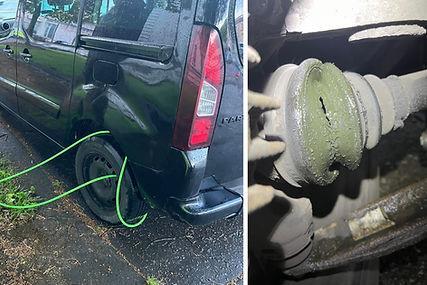
In a recent operation by the Driver and Vehicle Standards Agency (DVSA), a taxi in Cardiff was reported after being found to have significant safety issues, including two tyres that were below the legal tread depth.
Additionally, the vehicle had a split transmission CV joint gaiter, a critical component for vehicle safety and operation.
A DVSA Enforcement spokesperson highlighted the importance of routine vehicle checks, stating that the taxi was inspected in Cardiff and had multiple issues. The driver has since been reported for the tyres.
POLICE ARREST PRIVATE HIRE VEHICLE DRIVER FOR DRUG DRIVING DURING GREATER MANCHESTER OPERATION
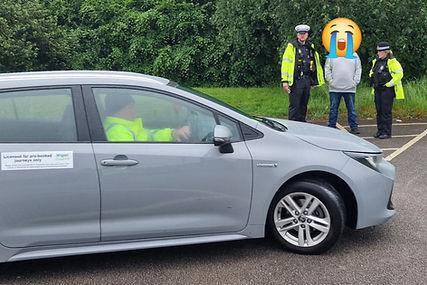
Taxi operators have been urged to perform thorough pre-use checks to identify and rectify potential safety issues, thereby avoiding penalties and more importantly, safeguarding the public.
A DVSA Enforcement spokesperson said: “Do you operate a Taxi or Private hire vehicle? This taxi was inspected in Cardiff, two tyres below the legal limit & a split transmission CV joint gaiter.
“The driver has been reported for the tyre offences.
“You can avoid this by conducting an adequate check before use.”
A Wigan Council licensed private hire vehicle (PHV) driver was taken into custody after failing a road side drugs test.
During the operation by Greater Manchester Police Traffic unit, the driver of the silver Toyota minicab was detained for drug driving following checks in Leigh.
The driver's vehicle was subsequently forwarded for a thorough inspection by the licensing authorities.
A Greater Manchester Police Traffic spokesperson said: “Have you been busy? What Time are you on till?
“Weirdly that's what this Taxi driver asked our Police Van Crew who took him to Custody following his arrest for drug driving at Leigh Operation ARVO.
“His vehicle was sent for taxi licensing inspection.“
38 | TAXIPOINT | JUNE 2024 | EDITION 62 WWW.TAXI-POINT.CO.UK
IMAGE CREDIT: GMP TRAFFIC IMAGE CREDIT: DVSA ENFORCEMENT











39 | TAXIPOINT | JUNE 2024 | EDITION 62 INSURANCE
EMISSIONS SYSTEMS APPS








40 | TAXIPOINT | JUNE 2024 | EDITION 62 WWW.TAXI-POINT.CO.UK FINANCE MEMBERSHIP CARD PAYMENTS GROUP CLAIM OUTSOURCE VEHICLE SALES







 TaxiPoint
TaxiPoint





























































